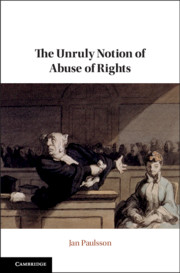Book contents
- The Unruly Notion of Abuse of Rights
- The Unruly Notion of Abuse of Rights
- Copyright page
- Dedication
- Contents
- Foreword: The Thesis and a Confession
- 1 Matters of Nomenclature
- 2 An Idealistic but Troublesome Impulse
- 3 A Cacophony of Criteria
- 4 A ‘Principle’ with No Rules?
- 5 The Challenge of Establishing Universal Principles
- 6 The Politis/Lauterpacht Quest to Elevate the Concept
- 7 Rejection and Retrenchment
- 8 The Vanishing Prospect
- Index
2 - An Idealistic but Troublesome Impulse
Published online by Cambridge University Press: 16 July 2020
- The Unruly Notion of Abuse of Rights
- The Unruly Notion of Abuse of Rights
- Copyright page
- Dedication
- Contents
- Foreword: The Thesis and a Confession
- 1 Matters of Nomenclature
- 2 An Idealistic but Troublesome Impulse
- 3 A Cacophony of Criteria
- 4 A ‘Principle’ with No Rules?
- 5 The Challenge of Establishing Universal Principles
- 6 The Politis/Lauterpacht Quest to Elevate the Concept
- 7 Rejection and Retrenchment
- 8 The Vanishing Prospect
- Index
Summary
‘Abuse of rights’ cannot be defined without using open-textured formulations which impede predictability. Bin Cheng did not call abuse of rights a principle, but a theory. In his laudatory preface of Jean-David Roulet’s comprehensive rejection of the notion that it could serve as a rule of international law, Cheng in fact declined to take a position as to ‘the place of the theory in international law’. Among national legal systems, the most notable movement to establish a principle of abuse of rights (expressed nowhere in the French Civil Code) arose in France at the end of the nineteenth century. It was, and remains, controversial. The common law has found ways to place limitations on the attempted exercise of rights without using the generic reference to abuse as a rule of decision. Conceptually, the notion of abuse of rights is not a necessary corollary to that of good faith.
- Type
- Chapter
- Information
- The Unruly Notion of Abuse of Rights , pp. 17 - 35Publisher: Cambridge University PressPrint publication year: 2020

